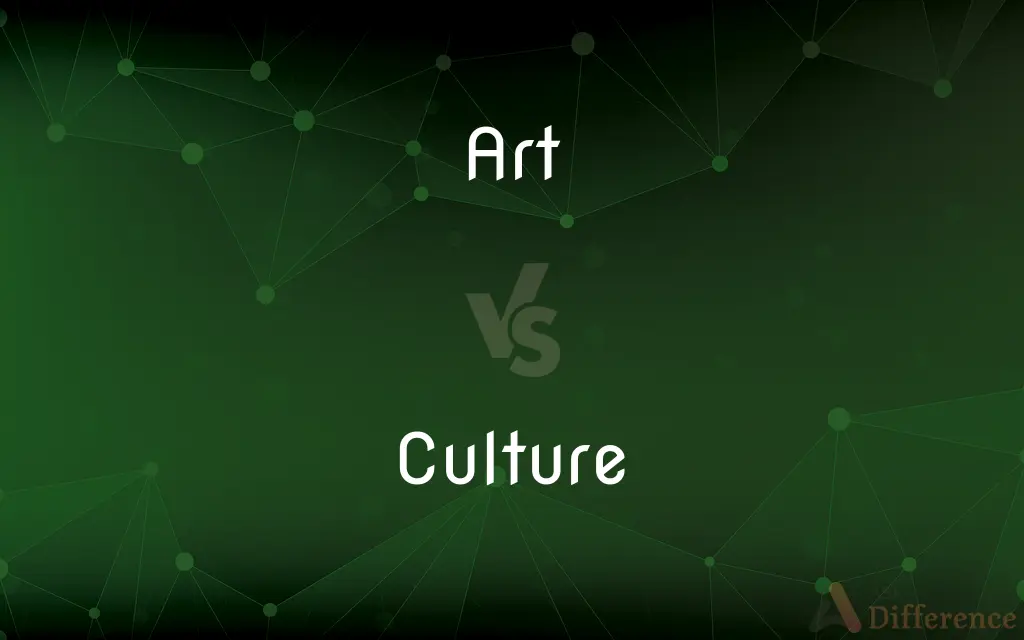Art vs. Culture — What's the Difference?
By Maham Liaqat & Urooj Arif — Updated on May 2, 2024
Art is the expression or application of human creative skill and imagination, typically in visual forms; culture encompasses the ideas, customs, and social behaviors of a particular people or society.

Difference Between Art and Culture
Table of Contents
ADVERTISEMENT
Key Differences
Art often manifests through mediums such as painting, sculpture, and music, focusing on aesthetic and emotional impact. Whereas culture is a broader concept that includes art, language, norms, and values, shaping the everyday life and identity of communities.
Artists create art to express personal or collective experiences, thoughts, and emotions, often producing tangible works like paintings or performances. On the other hand, culture is created and shared collectively, evolving over time through social interactions and shared practices.
Art can be a component of culture, reflecting the society's values or challenging its norms through various forms of expression. Culture, however, encompasses a wider array of human activities and institutions, including religion, cuisine, and social habits.
The appreciation and interpretation of art are heavily influenced by cultural context, which can determine the reception and value of an artwork. Conversely, culture can be documented and transmitted through art, serving as a historical record or a medium of change.
While art typically involves deliberate acts of creation by individuals or groups, culture often develops more organically, emerging from the collective practices and traditions of a people.
ADVERTISEMENT
Comparison Chart
Definition
Creation of works to express aesthetic or ideas.
The customs, arts, social institutions of a group.
Forms
Paintings, sculptures, music.
Language, rituals, art, beliefs.
Role
Individual expression and innovation.
Social identity and continuity.
Transmission
Through galleries, museums, performances.
Through social practices, education, family.
Change and Adaptation
Often rapidly evolving and personal.
Generally slow, communal evolution.
Compare with Definitions
Art
Art involves the creation of imaginative or skillful works that express emotional or aesthetic qualities.
The art exhibition featured stunning abstract paintings.
Culture
Culture is transmitted between generations through languages, rituals, and symbols.
Storytelling is an important cultural tradition in many indigenous communities.
Art
Art can be a solitary or collaborative endeavor.
The mural was painted by a group of artists from different backgrounds.
Culture
Cultural practices can vary widely across different regions and time periods.
Tea ceremonies are central to Japanese culture.
Art
Art can be performative, such as in dance and theater.
The ballet was a beautiful example of performative art.
Culture
Culture influences how individuals perceive and interact with the world.
His cultural background shapes his worldview and interactions.
Art
Artistic works often aim to provoke thought or evoke a specific emotion.
Her sculpture caused viewers to reflect on themes of freedom.
Culture
Culture encompasses the social behavior and norms found in human societies.
The festival is a vital part of local culture.
Art
Art is often categorized into various styles and movements.
Picasso is known for pioneering the Cubist movement.
Culture
Culture often includes the collective intellectual achievements of a society.
The library is a repository of our cultural heritage.
Art
Art is a diverse range of (and products of) human activities involving creative imagination to express technical proficiency, beauty, emotional power, or conceptual ideas.There is no generally agreed definition of what constitutes art, and ideas have changed over time. The three classical branches of visual art are painting, sculpture, and architecture.
Culture
Culture () is an umbrella term which encompasses the social behavior and norms found in human societies, as well as the knowledge, beliefs, arts, laws, customs, capabilities, and habits of the individuals in these groups.Humans acquire culture through the learning processes of enculturation and socialization, which is shown by the diversity of cultures across societies. A cultural norm codifies acceptable conduct in society; it serves as a guideline for behavior, dress, language, and demeanor in a situation, which serves as a template for expectations in a social group.
Art
The conscious use of the imagination in the production of objects intended to be contemplated or appreciated as beautiful, as in the arrangement of forms, sounds, or words.
Culture
The arts, beliefs, customs, institutions, and other products of human work and thought considered as a unit, especially with regard to a particular time or social group
Edwardian culture.
Japanese culture.
Art
Such activity in the visual or plastic arts
Takes classes in art at the college.
Culture
These arts, beliefs, and other products considered with respect to a particular subject or mode of expression
Musical culture.
Oral culture.
Art
Products of this activity; imaginative works considered as a group
Art on display in the lobby.
Culture
The set of predominating attitudes and behavior that characterize a group or organization
A manager who changed the corporate culture.
Art
A field or category of art, such as music, ballet, or literature.
Culture
Mental refinement and sophisticated taste resulting from the appreciation of the arts and sciences
A woman of great culture.
Art
A nonscientific branch of learning; one of the liberal arts.
Culture
Special training and development
Voice culture for singers and actors.
Art
A skill that is attained by study, practice, or observation
The art of negotiation.
Culture
The cultivation of soil; tillage
The culture of the soil.
Art
Arts Artful devices, stratagems, and tricks.
Culture
The breeding or cultivation of animals or plants for food, the improvement of stock, or other purposes.
Art
Artful contrivance; cunning.
Culture
The growing of microorganisms, tissue cells, or other living matter in a specially prepared nutrient medium.
Art
(Printing) Illustrative material, especially in contrast to text.
Culture
Such a growth or colony, as of bacteria.
Art
A second person singular present indicative of be.
Culture
To cultivate (soil or plants).
Art
(uncountable) The conscious production or arrangement of sounds, colours, forms, movements, or other elements in a manner that affects the senses and emotions, usually specifically the production of the beautiful in a graphic or plastic medium.
There is a debate as to whether graffiti is art or vandalism.
Culture
To grow (microorganisms or other living matter) in a specially prepared nutrient medium.
Art
(uncountable) The creative and emotional expression of mental imagery, such as visual, auditory, social, etc.
Culture
To use (a substance) as a medium for culture
Culture milk.
Art
(countable) Skillful creative activity, usually with an aesthetic focus.
She's mastered the art of programming.
Culture
The arts, customs, lifestyles, background, and habits that characterize humankind, or a particular society or nation.
Art
(uncountable) The study and the product of these processes.
He's at university to study art.
Culture
The beliefs, values, behaviour and material objects that constitute a people's way of life.
Art
(uncountable) Aesthetic value.
Her photographs are nice, but there's no art in them.
Culture
The conventional conducts and ideologies of a community; the system comprising the accepted norms and values of a society.
Art
(uncountable) Artwork.
Sotheby's regularly auctions art for millions.
Art collection
Culture
(anthropology) Any knowledge passed from one generation to the next, not necessarily with respect to human beings.
Art
(countable) A field or category of art, such as painting, sculpture, music, ballet, or literature.
I'm a great supporter of the arts.
Culture
(botany) Cultivation.
Art
(countable) A nonscientific branch of learning; one of the liberal arts.
Culture
(microbiology) The process of growing a bacterial or other biological entity in an artificial medium.
Art
(countable) Skill that is attained by study, practice, or observation.
Culture
The growth thus produced.
I'm headed to the lab to make sure my cell culture hasn't died.
Art
Contrivance, scheming, manipulation.
Culture
A group of bacteria.
Art
The second person singular, indicative mode, present tense, of the substantive verb Be; but formed after the analogy of the plural are, with the ending -t, as in thou shalt, wilt, orig. an ending of the second person sing. pret. Cf. Be. Now used only in solemn or poetical style.
Culture
(cartography) The details on a map that do not represent natural features of the area delineated, such as names and the symbols for towns, roads, meridians, and parallels.
Art
The employment of means to accomplish some desired end; the adaptation of things in the natural world to the uses of life; the application of knowledge or power to practical purposes.
Blest with each grace of nature and of art.
Culture
(archaeology) A recurring assemblage of artifacts from a specific time and place that may constitute the material culture remains of a particular past human society.
Art
A system of rules serving to facilitate the performance of certain actions; a system of principles and rules for attaining a desired end; method of doing well some special work; - often contradistinguished from science or speculative principles; as, the art of building or engraving; the art of war; the art of navigation.
Science is systematized knowledge . . . Art is knowledge made efficient by skill.
Culture
(euphemism) Ethnicity, race (and its associated arts, customs, etc.)
Art
The systematic application of knowledge or skill in effecting a desired result. Also, an occupation or business requiring such knowledge or skill.
The fishermen can't employ their art with so much success in so troubled a sea.
Culture
(transitive) to maintain in an environment suitable for growth especially of bacteria cultivate}}
Art
The application of skill to the production of the beautiful by imitation or design, or an occupation in which skill is so employed, as in painting and sculpture; one of the fine arts; as, he prefers art to literature.
Culture
(transitive) to increase the artistic or scientific interest in something cultivate}}
Art
Those branches of learning which are taught in the academical course of colleges; as, master of arts.
In fearless youth we tempt the heights of arts.
Four years spent in the arts (as they are called in colleges) is, perhaps, laying too laborious a foundation.
Culture
The act or practice of cultivating, or of preparing the earth for seed and raising crops by tillage; as, the culture of the soil.
Art
Learning; study; applied knowledge, science, or letters.
So vast is art, so narrow human wit.
Culture
The act of, or any labor or means employed for, training, disciplining, or refining the moral and intellectual nature of man; as, the culture of the mind.
If vain our toilWe ought to blame the culture, not the soil.
Art
Skill, dexterity, or the power of performing certain actions, acquired by experience, study, or observation; knack; as, a man has the art of managing his business to advantage.
Culture
The state of being cultivated; result of cultivation; physical improvement; enlightenment and discipline acquired by mental and moral training; civilization; refinement in manners and taste.
What the Greeks expressed by their paidei`a, the Romans by their humanitas, we less happily try to express by the more artificial word culture.
The list of all the items of the general life of a people represents that whole which we call its culture.
Art
Skillful plan; device.
They employed every art to soothe . . . the discontented warriors.
Culture
The cultivation of bacteria or other organisms (such as fungi or eukaryotic cells from mulitcellular organisms) in artificial media or under artificial conditions.
Art
Cunning; artifice; craft.
Madam, I swear I use no art at all.
Animals practice art when opposed to their superiors in strength.
Culture
Those details of a map, collectively, which do not represent natural features of the area delineated, as names and the symbols for towns, roads, houses, bridges, meridians, and parallels.
Art
The black art; magic.
In America, literature and the elegant arts must grow up side by side with the coarser plants of daily necessity.
Culture
To cultivate; to educate.
They came . . . into places well inhabited and cultured.
Art
The products of human creativity; works of art collectively;
An art exhibition
A fine collection of art
Culture
A particular society at a particular time and place;
Early Mayan civilization
Art
The creation of beautiful or significant things;
Art does not need to be innovative to be good
I was never any good at art
He said that architecture is the art of wasting space beautifully
Culture
The tastes in art and manners that are favored by a social group
Art
A superior skill that you can learn by study and practice and observation;
The art of conversation
It's quite an art
Culture
All the knowledge and values shared by a society
Art
Photographs or other visual representations in a printed publication;
The publisher was responsible for all the artwork in the book
Culture
(biology) the growing of microorganisms in a nutrient medium (such as gelatin or agar);
The culture of cells in a Petri dish
Culture
(bacteriology) the product of cultivating micro-organisms in a nutrient medium
Culture
A highly developed state of perfection; having a flawless or impeccable quality;
They performed with great polish
I admired the exquisite refinement of his prose
Almost an inspiration which gives to all work that finish which is almost art
Culture
The attitudes and behavior that are characteristic of a particular social group or organization;
The developing drug culture
The reason that the agency is doomed to inaction has something to do with the FBI culture
Culture
The raising of plants or animals;
The culture of oysters
Common Curiosities
Can art exist independently of culture?
While art can be created independently, its interpretation is often influenced by cultural contexts.
How does culture affect an individual?
Culture shapes an individual’s values, behaviors, and perceptions, influencing their everyday decisions and interactions.
What role does art play in preserving culture?
Art plays a crucial role in preserving and transmitting cultural heritage through visual, written, and performative mediums.
What is the primary purpose of art?
Art primarily serves as a medium for personal or collective expression and aesthetic engagement.
Is art a part of culture?
Yes, art is considered an integral component of culture, reflecting and sometimes challenging cultural norms.
How are new cultural practices developed?
New cultural practices are often developed through social innovation, migration, and cross-cultural interactions.
How does globalization affect culture?
Globalization can lead to the blending of cultures but also poses risks to the preservation of unique cultural identities.
Can culture be learned?
Yes, culture is learned behavior that is acquired from being part of a society.
What is cultural heritage?
Cultural heritage refers to the traditions, customs, and artifacts handed down by previous generations, forming the basis of community identity.
What is cultural diversity?
Cultural diversity refers to the variety of cultural expressions, practices, and beliefs that exist among different groups.
Share Your Discovery

Previous Comparison
Ubuntu vs. Kubuntu
Next Comparison
Boerboel vs. RottweilerAuthor Spotlight
Written by
Maham LiaqatCo-written by
Urooj ArifUrooj is a skilled content writer at Ask Difference, known for her exceptional ability to simplify complex topics into engaging and informative content. With a passion for research and a flair for clear, concise writing, she consistently delivers articles that resonate with our diverse audience.
















































